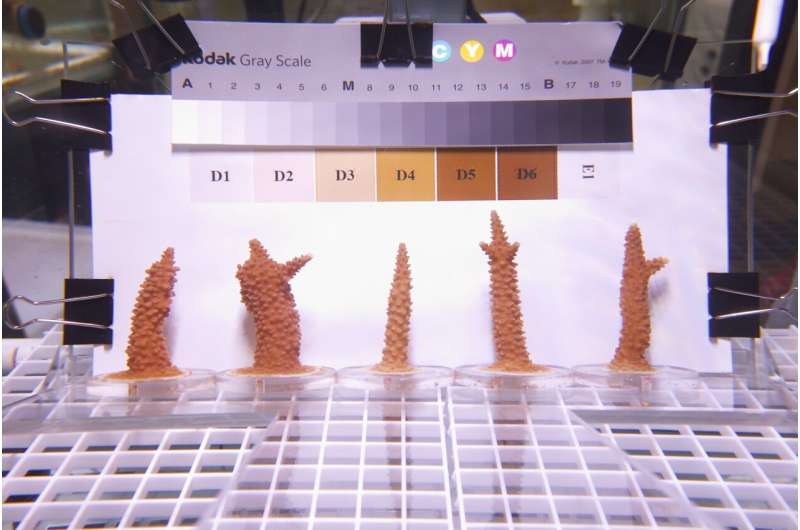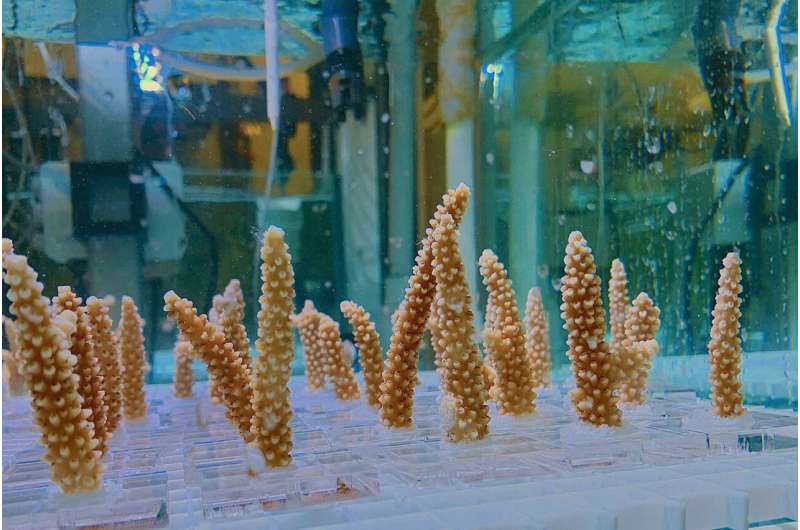
A new study led by researchers at the University of Miami found that corals that underwent a stress treatment in the laboratory were more tolerant of increased water temperatures.
Coral restoration scientists have a new approach to increase the success rate of planting nursery-raised staghorn coral onto degraded reefs as climate change continues to warm ocean temperatures, resulting in more frequent coral bleaching events. Staghorn coral has died off throughout South Florida and the Caribbean, and is listed as a threatened species on the Endangered Species Act.
While previous stress-hardening experiments on corals have utilized exposure to short-term temperatures, the UM Rosenstiel School team assessed the effect of a long-term, variable treatment where temperatures reached a stress level twice per day.
The training regime is similar to an athlete preparing for a race, according to the study.
To conduct the experiment, DeMerlis and scientists at the National Oceanographic and Meteorological Laboratory and the University of Michigan collected coral fragments from six distinct genetic individuals of Caribbean staghorn coral. The laboratory control and variable temperature-treated corals were subjected to a three-month treatment period where the laboratory controls were kept at a constant 28 degrees Celsius.
The scientists took pictures of the coral before and after it was exposed to thermal stress. The coral's endurance in thermal stress was significantly improved by the variable temperature treatment. They found that corals with no treatment were more likely to die of disease-like signs.

The benefit of using a variable temperature treatment in a laboratory setting for maintaining coral is shown in the findings. This may be translated into the field for restoration practitioners to identify locations where their coral nurseries and outplanting sites can be exposed to more fluctuating temperatures.
Ian Enochs, senior author of the study and a coral scientist at the Atlantic Oceanographic and Meteorological, said that we have reached the point where active intervention and restoration are necessary to ensure that valuable coral reefs are able to persist for generations to come.
Our findings bring a glimpse of hope to the uncertain future of corals, as we were able to identify a treatment that could enhance their tolerance to heat stress.
The study titled "Pre-exposure to a variable temperature treatment improves the response of Acropora cervicornis to acute thermal stress" was published in the journal Coral Reefs.
More information: Allyson DeMerlis et al, Pre-exposure to a variable temperature treatment improves the response of Acropora cervicornis to acute thermal stress, Coral Reefs (2022). DOI: 10.1007/s00338-022-02232-z Journal information: Coral Reefs Citation: Corals can be 'trained' to tolerate heat stress, study finds (2022, March 3) retrieved 3 March 2022 from https://phys.org/news/2022-03-corals-tolerate-stress.html This document is subject to copyright. Apart from any fair dealing for the purpose of private study or research, no part may be reproduced without the written permission. The content is provided for information purposes only.